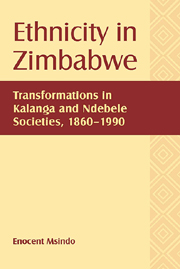Book contents
- Frontmatter
- Contents
- List of Illustrations
- Acknowledgments
- List of Abbreviations
- Note to the Reader
- Introduction
- 1 Ethnicity and Identities in Matabeleland
- 2 Domination and Resistance: Precolonial Ndebele and Kalanga Relations, 1860–93
- 3 Remaking Communities on the Margins: Chieftaincy and Ethnicity in Bulilima-Mangwe, 1893 to the 1950s
- 4 Ultraroyalism, King's Cattle, and Postconquest Politics among the Ndebele, 1893 to the 1940s
- 5 Language and Ethnicity in Matabeleland
- 6 Contests and Identities in Town: Bulawayo before 1960
- 7 Complementary or Competing? Ethnicity and Nationalism in Matabeleland, 1950–79
- 8 Postcolonial Terror: Politics, Violence, and Identity, 1980–90
- Conclusion
- Notes
- Selected Bibliography
- Index
- Rochester Studies in African History and the Diaspora
5 - Language and Ethnicity in Matabeleland
Published online by Cambridge University Press: 05 February 2013
- Frontmatter
- Contents
- List of Illustrations
- Acknowledgments
- List of Abbreviations
- Note to the Reader
- Introduction
- 1 Ethnicity and Identities in Matabeleland
- 2 Domination and Resistance: Precolonial Ndebele and Kalanga Relations, 1860–93
- 3 Remaking Communities on the Margins: Chieftaincy and Ethnicity in Bulilima-Mangwe, 1893 to the 1950s
- 4 Ultraroyalism, King's Cattle, and Postconquest Politics among the Ndebele, 1893 to the 1940s
- 5 Language and Ethnicity in Matabeleland
- 6 Contests and Identities in Town: Bulawayo before 1960
- 7 Complementary or Competing? Ethnicity and Nationalism in Matabeleland, 1950–79
- 8 Postcolonial Terror: Politics, Violence, and Identity, 1980–90
- Conclusion
- Notes
- Selected Bibliography
- Index
- Rochester Studies in African History and the Diaspora
Summary
Language, Society, and Identities
In the last two chapters, we discovered how Kalanga commoners, chiefs, and headmen resisted a colonially crafted hegemonic project to subject them to Ndebele political and social control. We also saw how divisions among the Ndebele elites made it difficult for strong ideological entrepreneurs to arise in rural Matabeleland before the 1940s. It is important to discuss another arena in which Ndebele and Kalanga ethnicity was negotiated—the politics of language making and control. Building on the thesis that language difference provides an anchorage for ethnic identity, this chapter examines the use of language by the Ndebele and Kalanga to express their ethnic identities from the 1930s. To the Kalanga, debates about TjiKalanga were born out of a quest for ethnic revival and the desire to resist a developing broad-based Ndebele identity, given the official sidelining of the Kalanga language after 1930. For the Ndebele, debating isiZulu and isiNdebele illustrated different social and moral standpoints about the meaning of being Ndebele, which is central to any analysis of Ndebele ethnicity. The Ndebele people were divided between those who advocated the use of isiZulu on the belief that, sociolinguistically speaking, Zulu was their impande (root). Those who preferred isiNdebele advanced a different argument: that using isiNdebele represented the cultural and linguistic adaptability of a people, and that the Ndebele were not essentially a subset of the Zulu people of South Africa.
- Type
- Chapter
- Information
- Ethnicity in ZimbabweTransformations in Kalanga and Ndebele Societies, 1860-1990, pp. 115 - 135Publisher: Boydell & BrewerPrint publication year: 2012

